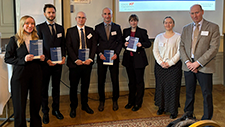Exploring Work-Life Balance Through a Gender Lens: Experiences from South Korea and the Nordics

Tove Jalmerud and Josephine Ørgaard Rasmussen
Balancing professional and personal opportunities and responsibilities is essential for improving well-being and productivity, prompting many governments and businesses to introduce policies supporting this goal. However, many people still struggle to achieve work-life balance, as gender-related factors like prevailing gender norms, family responsibilities, and societal expectations create additional barriers. South Korea is rapidly recognizing the importance of improving work-life balance, partly due to its problematic demographic position. Meanwhile, the Nordics are frequently regarded as pioneers in gender equality and work-life balance, although significant challenges still remain. In both regions, discussions around flexible working hours, remote work, and parental leave have gained momentum, reflecting a broader push for a better balance between work and personal life. So how are
these issues experienced at the individual level?
In anticipation of our forthcoming conference on Gender and Work-Life Balance in South Korea and the Nordics, ISDP’s Korea Center interviewed two South Korean women on their experiences and perceptions of work-life balance in these regions. Both women are familiar with the Nordic countries and the aspects that shape the region’s work-life balance. The interviewees vary in age and family situation in order to highlight potential differences and implications of work-life balance across different stages of life.
Related Publications
-
The Future of Korean Research from a Nordic Perspective
The Nordic countries are long-standing partners to South Korea, engaging in dialogue and collaborating on regional and global concerns since 1959. Despite a long history of state-level cooperation, the Nordic […]
-
The US and EU, and the Emerging Supply Chain Network: Politics, Prospects, and Allies
The Global Supply Chains have evolved from simply logistical achievements to being the bedrock of the global economy. Driven by technological advances and geopolitical shifts, this transformation underscores the critical […]
-
Russia-DPRK Partnership: Implications for the West
This issue brief examines the evolving relationship between the DPRK and Russia, particularly since Russia’s invasion of Ukraine in 2022. The partnership has deepened, with North Korea supporting Russia diplomatically […]
-
Safeguarding intellectual property in the wake of digital authoritarianism: An Interview with DR. REBECCA SPYKE KEISER
Dr. Rebecca Spyke Keiser is the Chief of Research Security Strategy and Policy (CRSSP) at the National Science Foundation (NSF). The U.S. National Science Foundation is an independent federal agency […]
-
Strategic Trade Dynamics: Unpacking De-risking and De-coupling in EU-China Relations
What goes on between the EU and China is of vital significance to global trade and our efforts to provide economic stability. Right now, the EU-China trade relationship could be […]




